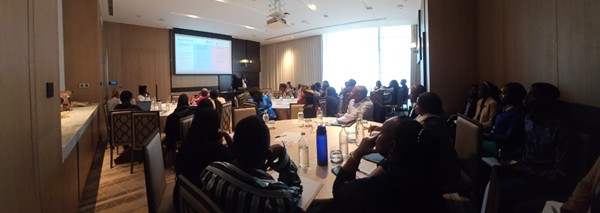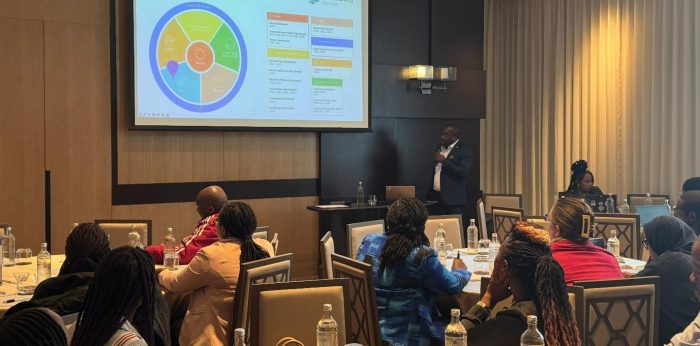Parallel Session 3 – What’s key to ensuring an inclusive approach to digital acceleration
This workshop featured presentations and roundtable discussions based on the Digital Inclusion Benchmark and Ranking Digital Rights. The session began with an introduction and overview of the methodologies and findings from WBA’s benchmarks, after which an open discussion was held on the learnings from the latest available research data, to identify linkages and opportunities for advocacy and stakeholder engagement in Africa. In the second part of the session, stakeholders were invited to share what they consider to be the most pressing issues undermining digital rights and inclusion, in connection to the footprint and impacts of the Digital Transformation’s 200 companies and beyond. The aim of this exercise will be to foster a broader conversation about tech corporate accountability in Africa.
Discussion points and summaries
This session spotlighted the digital transformation taking place in Africa and focused on how we can ensure that digital rights are inclusive and that human rights are respected in digital spaces. One key observation from participants, was that stakeholders are rapidly recognizing the growing challenges around digital rights, data privacy, internet access inequality, and online safety in Kenya. Specific concerns which were raised included children’s online protection, and the harassment women face on social media platforms.
The session’s main speaker emphasized the responsibilities of tech companies and telecom providers within the digital landscape, while also talking about how stakeholders in the digital rights space can leverage data for advocacy. A recurring theme throughout was the use of the World Benchmarking Alliance’s Digital Inclusion Benchmark and the Ranking Digital Rights Index to hold companies accountable and guide policy and advocacy efforts.
During the roundtable discussions, one of the key takeaways was the existence of a digital divide—both in terms of rights and corporate responsibility. Although mobile and internet infrastructure has expanded across Africa, the region still lags in access compared to global standards. For example, while 4G network coverage in Africa stands at around 44%, the global average is 84%, highlighting a significant gap. Many people—especially in rural and low-income communities—still lack access to reliable internet. This inequality in access was a central concern, as it worsens socioeconomic disparities.


Pictures: Digital parallel session’s discussion, facilitated by the World Benchmarking Alliance
It was also noted that women and marginalized groups face the greatest digital exclusion. People with disabilities and women in African countries are often underserved in digital spaces. The discussion underscored the importance of ensuring that digital transformation drives inclusive development, and that no one is left behind.
Another key theme was privacy and data protection. Kenya has taken steps to address this through the Data Protection Act (2019) to safeguard personal data. However, participants expressed concern that enforcement and corporate compliance have not yet matched the law’s intent. There was growing alarm about the amount of user data being collected by both local and global tech companies operating in Kenya and across Africa. Civil society organizations are increasingly calling for greater transparency around how this data is used and protected.
The roundtables also explored issues of online safety and content governance, including concerns about cyberbullying, misinformation, and the rise of hate speech. A particularly notable issue was the rise in online gender-based violence, with many women and girls facing harassment and abuse on digital platforms, deterring them from engaging online. Participants strongly advocated that tech companies must improve their policies and tools for reporting and prevent such abuse. Companies were also called upon to mitigate risks to children and to be more transparent about how algorithms may be contributing to incitement or fraud.
Key takeaways
- Data needs to be simplified and contextualized for it to be usable for advocacy in Africa. Stakeholders were keen to learn how WBA’s methodologies can be localised/applied to local contexts, including by applying storytelling methods to humanize data, and translating complex data into accessible formats (infographics, dashboards, briefs). Having strategic partnerships with local actors are also key to allow data to be contextualized. Inclusive platforms, such as the African Evidence Leadership Award was noted for its promotion of collaboration between academia, governments, and civil society. Others were also interested on the Collective Impact Coalitions, what the group constitute and how they can get involved.
- Leveraging technologies to collect local data, allowing for further contextualization of data. Among some of the recommendations that were mentioned by stakeholders had been: the use of GIS, big data, and machine learning in sectors like health (e.g., COVID-19 dashboards) and agriculture. Crowdsourcing and citizen science for data collection and monitoring may also be applicable for certain data.
- Capacity constraints and bureaucratic barriers remains a challenge in evidence-based advocacy. Some participants suggested organising workshops on methodologies, and capacity building sessions on key issues addressed by the methodologies to equip stakeholders (e.g., CSOs, governments, others) with the applicable knowledge to conduct their own assessment, while also addressing reservations around using data and research findings for advocacy and promotion of policies.